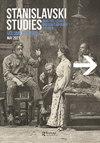Auditions and … more auditions
IF 0.1
0 THEATER
引用次数: 0
Abstract
ABSTRACT This is the third of a four-part series of interrelated articles discussing the pedagogical, ideological, and sociological functions of the audition process in drama school training. For this third paper, we have re-interviewed our contributors in 2019, as they come towards the end of their formal training. We have asked them to compare their experiences of professional auditions with their experiences of auditioning for drama school recounted for the first two papers. Their accounts describe a complex and contradictory response to the process of audition which negates any possible interpretation of a linear or progressive development. This is apparently at odds with the pedagogic strategies pursued during their studies. Aiming to explain that dissonance we draw on the Bergsonian concepts of “clock time” and “psychological time” to help to classify and analyse these experiences, broadly categorizing these with reference to an actor’s own conscious states in audition. Using Stanislavksi’s writing as a key point of reference allows us to align our theorization with his discussion of a long-term and indeterminant pedagogical process of actor development. This is also counterpointed by Stanislavski’s recognition that technique, no matter how it has been acquired or how competently it may have been mastered may not be sufficient for the actor to exercise her craft. In the last section of this article, we utilize Csikszentmihalyi theorization of “flow” states in order to reinforce the distinction felt by our interviewees between auditions determined by/in “clock time” and those inscribed within/by the psychological time, which Bergson calls la durée.试镜,更多的试镜
本文是讨论戏剧学校培训中试镜过程的教学、思想和社会学功能的四部分系列文章的第三部分。对于第三篇论文,我们在2019年重新采访了我们的撰稿人,因为他们即将结束正式培训。我们要求他们将自己的专业试镜经历与前两篇论文中所述的戏剧学校试镜经历进行比较。他们的描述描述了对听觉过程的复杂和矛盾的反应,否定了任何可能的线性或渐进发展的解释。这显然与他们在学习过程中所追求的教学策略不一致。为了解释这种不和谐,我们借鉴了柏格森的“时钟时间”和“心理时间”的概念来帮助分类和分析这些经历,并根据演员自己在试镜中的意识状态对这些经历进行了广泛的分类。将斯坦尼斯拉夫斯基的著作作为一个关键的参考点,使我们能够将我们的理论与他关于演员发展的长期和不确定的教学过程的讨论结合起来。这也与斯坦尼斯拉夫斯基的认识相对应,即技术,无论它是如何获得的,或者它是如何熟练地掌握的,都不足以让演员锻炼她的技巧。在本文的最后一部分,我们使用了Csikszentmihalyi的“心流”状态理论,以加强我们的受访者对由“时钟时间”决定的试镜和由心理时间决定的试镜之间的区别,Bergson称之为la dur。
本文章由计算机程序翻译,如有差异,请以英文原文为准。
求助全文
约1分钟内获得全文
求助全文

 求助内容:
求助内容: 应助结果提醒方式:
应助结果提醒方式:


